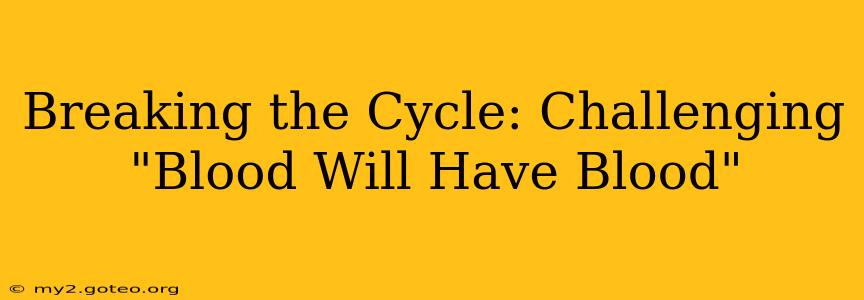The phrase "blood will have blood" echoes through history, literature, and even modern discourse, suggesting an inescapable cycle of violence and retribution. This ancient adage, rooted in the concept of revenge and retribution, implies that violence begets violence, creating a seemingly endless loop of suffering. However, understanding the psychological and sociological underpinnings of this cycle allows us to actively challenge and break it. This article delves into the complexities of this ingrained belief, examining its origins and offering pathways towards a more peaceful future.
What Does "Blood Will Have Blood" Actually Mean?
The core meaning of "blood will have blood" points to a deterministic view of violence. It suggests that when someone is harmed or killed, a violent response is inevitable, almost a natural law. This notion often finds its roots in concepts of honor, justice, or even primitive tribal dynamics where retaliation was a crucial part of maintaining social order. However, this interpretation neglects the agency of individuals and the possibility of choosing a different path.
Why Do We Believe in the "Blood Will Have Blood" Cycle?
Several factors contribute to the persistence of this belief:
- Emotional Response: The immediate emotional reaction to violence is often anger, grief, and a desire for revenge. These powerful emotions can cloud judgment and make it difficult to consider alternative responses.
- Social Conditioning: In many societies, violent retaliation is portrayed (either implicitly or explicitly) as a justifiable or even heroic response to wrongdoing. This normalization of violence through media, cultural narratives, and even certain legal systems contributes to the perpetuation of the cycle.
- Lack of Alternative Mechanisms: The absence of effective systems for conflict resolution and restorative justice can leave individuals feeling that revenge is their only recourse. This is particularly true in contexts marked by societal instability, corruption, or weak governance.
How Can We Break the Cycle of Violence?
While challenging ingrained beliefs is never easy, several strategies can help break the "blood will have blood" cycle:
1. Fostering Empathy and Understanding:
Developing empathy for the perpetrators and victims of violence is crucial. Understanding the root causes of violent actions – poverty, trauma, inequality, etc. – can help to de-escalate conflict and prevent further violence. This involves challenging simplistic narratives and embracing complexity.
2. Promoting Restorative Justice:
Restorative justice practices focus on repairing harm and rebuilding relationships, rather than simply punishing offenders. These approaches, which prioritize dialogue, reconciliation, and community involvement, offer a potent alternative to cycles of revenge.
3. Investing in Conflict Resolution Mechanisms:
Effective conflict resolution mechanisms, including mediation, arbitration, and negotiation, provide structured avenues for addressing disputes peacefully. This requires investment in training, education, and accessible resources.
4. Challenging Violent Narratives in Media and Culture:
The way violence is portrayed in media significantly impacts societal attitudes. Challenging the glorification of violence and promoting alternative narratives that emphasize peace, reconciliation, and forgiveness is essential.
5. Addressing Root Causes of Violence:
Poverty, inequality, discrimination, and lack of opportunity are all significant drivers of violence. Addressing these systemic issues through social and economic policies is crucial for preventing violence in the first place.
Is Breaking the Cycle Realistic?
Breaking the cycle of violence is not a simple task. It requires a fundamental shift in societal attitudes and practices, involving sustained effort and commitment from individuals, communities, and governments. However, the numerous successful examples of conflict resolution and peacebuilding around the world demonstrate that it is possible. While the "blood will have blood" mentality might seem deeply entrenched, it is not an immutable law. By actively choosing empathy, restorative justice, and peaceful conflict resolution, we can build a more peaceful and just future for all.

